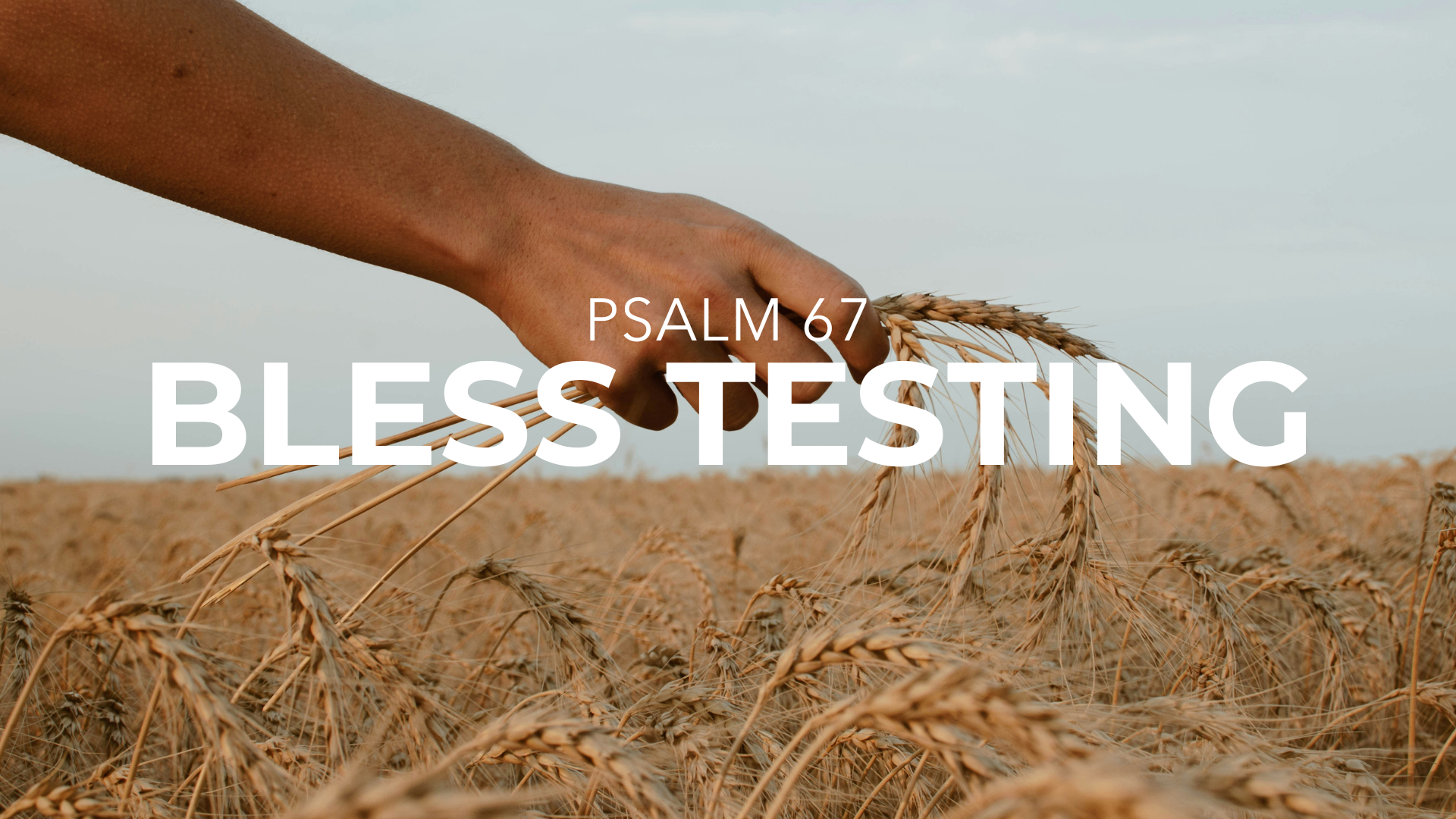
Bless Testing (Psalm 67)
One of the most common prayers in the life of a Christian is for God to “bless” us. To bless our families, to bless our travel, to bless our food, to bless our sneezes. I bet some of you have “bless this mess” framed and hanging somewhere in your home.
God’s people have always asked Him for blessing: That God would divert some of His power and attention and activity toward our lives and our situations.
In the very first book of the Bible, nearly 4,000 years ago, we see Jacob awake and alone in the middle of the night. His clothes wet from crossing the brook of Jabbok. He’s pretty sure that his estranged brother is going to try to kill him and his family when the morning comes.
In that moment, the Lord comes to Jacob. Jacob wrestles with Him all night. As the sun began to rise, the Lord said, “It’s time to let Me go.” Jacob said: “I will not let You go until You bless me.”[1]
It’s not a bad request. The Lord wants to interact and intervene and invigorate our lives. In fact, hundreds of years later, when God gave the Law to Moses, He gave special attention to how He wanted Aarons and his sons to tell the people about how God wants to bless them.
Numbers 6:22-27 – 22 The LORD spoke to Moses: 23 “Tell Aaron and his sons, ‘This is how you are to bless the Israelites. You should say to them, 24 “May the LORD bless you and protect you; 25 may the LORD make his face shine on you and be gracious to you; 26 may the LORD look with favor on you and give you peace.” ’ 27 In this way they will pronounce my name over the Israelites, and I will bless them.”
In the New Testament, when the disciples came to Jesus and said, “Teach us to pray,” He gave them what is commonly called the Lord’s prayer. And though the word “bless” isn’t found in it, we see it has multiple requests of God for help and for forgiveness and for provision – for God’s favor.
This morning we have Psalm 67. A song that begins and ends with blessing. It has been called the Lord’s prayer of the Old Testament,[2] and is centered around the hope that God would bless us.
So we want God to bless us. We see that God wants to bless us. Great! So should I get my wish list going? Should I start to let God know all the things He needs to do for me?
As we examine the Scripture, we begin to understand that our ideas of blessing are not necessarily what the Lord intends to do or to give. Our definition of “bless” often means, “Give us certain things.” Chariots. Horses. Deliverance. God’s definition of blessing might include tangible provision, but it really is about His presence. His presence with us and His present work in our lives. His blessing is not meant to simple be a bailout when we’re in a jam. Rather, it is about the Lord’s global enterprise spanning every generation to accomplish His glorious will for all the world.
So let’s look at this song and consider what it means when we pray, “Lord, bless us.”
Psalm 67:1 – 1 May God be gracious to us and bless us; may he make his face shine upon us Selah
Pastor Chuck Smith was right when he said God’s grace changes everything. His has true sympathy and compassion for us. Rather than look on our weakness with disgust, He extends mercy and kindness, freely given. In His grace, He is willing to grant pardons to people like Nebuchadnezzar or Saul of Tarsus. He even showed a measure of mercy to Ahab at the end of his life.[3]
But His grace is not only a pardon on the judicial level. That would be enough, but God isn’t just a Judge, He’s also our Father. He loves us and wants to be present in our lives. Verse 1 invokes the priestly blessing of Numbers 6, reminding us that not only do we want a pardon, but also His abiding presence – that His face would shine upon us day in and day out.
Linguists point out that the Hebrew terms used here literally say make He make His face shine with us,[4] or among us.[5] And so the prayer here asks God to be near, shining His light that brings life and growth and cleansing and vision for us, with us, among us.
Now, right after the very first verse we have a Selah. It’s the earliest time out in all the Psalter. Back in 2016, the Cleveland Browns once called a timeout before the first play of the game![6] There’s debate over the exact meaning, but essentially Selah was an interlude. Some scholars believe it meant, “There, what do you think of that?”[7] A person singing this Psalm has just said, “God, graciously bless us.” And now, they should stop and evaluate what kind of blessing they want.
Do we think of God as a genie and our prayer as rubbing the lamp? Don’t get me wrong: God absolutely wants and commands us to bring our problems and our cares and our requests to Him. But I know it’s much easier in my own life to pray, “Lord, make Your bank overflow in payouts to me,” than it is to pray, “Lord, just let Your presence to shine in my life.” But one of the things Psalm 67 helps us understand is that what we really need is God’s presence and activity, more than we need finite worldly provisions. In fact, let’s see the point of God blessing us in verse 2:
Psalm 67:2 – 2 so that your way may be known on earth, your salvation among all nations.
When God blesses us, He does so because He truly loves and cares for us. But He also wants to build a testimony through our lives. A testimony of His grace, His power, His ability, His deliverance. His intention is not only to address my need, but also to address the needs of the world through His activity in my life circumstances.
Look at the scope of God’s plan: all the nations, all the earth. Again, we can go back to Genesis and listen to God explain His intentions. He said to Abram, “I’m going to bless you with a new life, a new identity, a wonderful, hopeful future, but I also want to bless all the nations through you.”[8]
As God interacted with Abraham, it wasn’t only for him to feel better or be more comfortable or financially secure. There was always this larger goal of showing the world. Revealing to a watching world what God wanted and what God can do and the way God does things.
So that Your way may be known on earth. God’s grace and blessing in our lives is meant to reveal Him to a needy world – a lost world. As we seek God’s blessing, we want to remind ourselves that the end goal is not that I always have easier circumstances, but that redemption and providence and revelation would take place through my life. As I receive God’s grace and exercise my faith, the world around me should be able to visibly see that the God of the Bible is a Deliverer. That He has delivered me from worry. That He has delivered me from hate. That He has delivered me from greed. That instead of going the way of the world, I’m walking on a totally separate road, which leads to life and joy and peace and contentment, even when the path in front of me is difficult.
Psalm 67:3-4 – 3 Let the peoples praise you, God; let all the peoples praise you. 4 Let the nations rejoice and shout for joy, for you judge the peoples with fairness and lead the nations on earth. Selah
How many times do the Psalms need to tell us to worship the Lord? Do we really need 150 chapters? Is it really that important for me to stop and offer a melody of praise when God already knows how I feel about Him?
Sometimes we become less impressed with things the more familiar we are with them. The first time you saw a card trick, it was thrilling. The 10th time we agree with B.B. King: The thrill is gone.
It’s easy for humans to take amazing things for granted. It may be 100 degrees outside, but not in here. We push a button and, thanks to the genius and engineering and hard work of many people long ago, it’s a much more enjoyable 75 in here. I don’t even think about it.
Or, when we pick up bacteria that would’ve absolutely killed us a couple generations ago, now we just take little pill and we’ll be absolutely fine. We get used to incredible things.
But listen: We don’t want our adoration of God’s greatness to become numb. We don’t want the object of our faith to become commonplace in our minds. The more we know God, the more in awe of Him we should be. The more we meditate on Him, the more thrilled we should be.
As we look again and again at the Word of God and grow in our knowledge of Jesus and see Who He is and what He’s done, hopefully we’ll realize we don’t know the half of His goodness, His grace, His power, His love for us. That we will be more and more astonished at His greatness.
The worship we see described in verses 3 and 4 is an informed worship. This is praise from a people who have seen God’s will played out over the long term – people who have seen the marvels of God’s grace not just on the personal level, but even at the societal level. How God sovereignly accomplishes His gracious and providential work for the good of the people of earth.
One day, God’s work will culminate in total victory where every knee will bow and every tongue will confess Jesus Christ is Lord. A day when His Kingdom will be established and all the wrongs will be righted. The nations will flow to Jerusalem to obey the Lamb and worship Him.
But it’s not today. Because of God’s long-suffering, today we are still waiting for His work to be completed. And we Christians are invited to be a part of the effort. We’re invited to be led now.
Did you see there in verse 4? God leads the nations. He leads, we follow. We watch for Him, listen to Him, walk after Him as He shows us the way to go. And as we go, we sing with an informed worship. Knowing He is able. Knowing He can be trusted. Knowing He has a plan for this world.
In this song of praise, the believers acknowledge that Christ is in charge. He is Captain and Savior. He is our Representative and Advocate. He is our Shield and Exceedingly Great Reward.
Psalm 67:5 – 5 Let the peoples praise you, God, let all the peoples praise you.
This is a repetition of verse 3. Once was not enough. Psalms always reminds us of the importance and power of praise. That it matters when God’s people pause what we’re doing, set aside hurts and concerns for a few moments, and lift high the name of our God. It is not only a good thing, it is truly an end goal for all humanity. And as believers, we choose to do now what we know everyone will do someday. We align our behavior with that perfect future where Christ is on His throne and all the world is under His reign.
Psalm 67:6 – 6 The earth has produced its harvest; God, our God, blesses us.
In verse 1 we ask God to bless us. Here in verse 6 we acknowledge that He really does! It’s not just something we say – not a hope in vain. God is blessing us in countless ways, day by day.
Right now, on our kitchen window, we have a little science experiment running. Three little beans were put in a plastic bag on a wet paper towel and taped onto the window. After a few days, those beans have sent roots downward and shoots upward. From those dry little beans has come leaves and growth that is amazing to behold.
The Christian knows that happens not because of random chance, but only by God’s grace. He has designed and sustained a world for us where if you put a bean in the ground, it will make more beans. God gives us a system that works all day, every day, for our survival and growth and blessing. The earth producing harvest after harvest, again and again, because God loves us.
Notice the personal attachment: God, our God, blesses us. Is He your God? You see, God gives what we call “common grace” to all the world. Sunlight, rain, wind to spread seed. But to truly receive God’s grace for life and eternity, He must be your God. You must belong to Him.
What an amazing thing that the Creator of Heaven and Earth has given Himself to us. He has made a covenant: “I will be their God and they will be My people.”[9] And now we get to participate in the harvest of His grace in our lives if we are willing to receive this covenant in His blood.
Psalm 67:7 – 7 God will bless us, and all the ends of the earth will fear him.
So we start the song saying, “God, please bless us.” By the end we’re assured this is a God Who wants to bless His people, a God Who does bless day-by-day, and a God Who will continue to do this gracious work in the future.
The Lord can be counted on because He is the same yesterday, today, and forever. He is always faithful, always true, full of love toward us.
And so, as we seek the Lord’s work of blessing in our lives, notice how the song closes: The fear of God. This does not mean terror, but an awed recognition of Who God is. A recognition of what He has done which will then show us the purpose of our lives.
Most of us pray every day for God to bless us in some way. He wants to, according to His compassionate care for us and according to His wonderful, merciful intentions for the whole world. But as we ask, let’s remember the examples we’ve been given in Genesis, in Psalms, in the Gospels. Remembering that God’s blessing is part of a grand work of grace. And that from His perspective, what we need is His presence and present work in our lives more than temporal things we might have on our minds. And His blessing might really change our lives in ways we can’t anticipate.
Jacob said, “I won’t let You go unless you bless me.” God did bless him with a hopeful future, a new identity, a greater purpose than Jacob had ever known. And He blessed Jacob with a limp for the rest of his life. But what a good thing He did. What a good thing God blessed Abraham with the life of a sojourner. What a good thing the Lord blesses us according to His favor, not only our feelings.
| ↑1 | Genesis 32:24-26 |
|---|---|
| ↑2 | Herbert Lockyer Psalms: A Devotional Commentary |
| ↑3 | 1 Kings 21:28-29 |
| ↑4 | Robert Alter The Hebrew Bible: A Translation With Commentary |
| ↑5 | J.J. Stewart Perowne Commentary On The Psalms |
| ↑6 | https://www.cbssports.com/nfl/news/look-browns-go-full-browns-call-timeout-before-first-play-of-game/ |
| ↑7 | John Phillips Exploring The Psalms, Volume 1 |
| ↑8 | Genesis 12:3 |
| ↑9 | Hebrews 8:10 |








